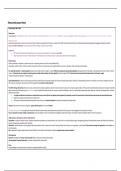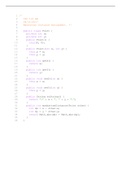Democratic peace theory
Michael Doyle 1983 + 1986
Good quotes
Liberal states are “inherently peace-loving”; “spirit of commerce” “Guarantee of respect”; Kant correct in his “prediction”; “wars are only fought for popular, liberal purposes” (popularity can be manufactured, and liberal is not static)
Historical context:
Liberal state is specifically not communist or socialist. Economic rights are characteristic of the times, in contest with the USSR. He distinctly attacks Marxism: Leninists expected liberal capitalists to be aggressive towards non liberal
states…[and] liberal capitalists. It is a point to disprove Marxist ideology + replace with own ideology.
Application:
• DPT informed US foreign policy following the cold war → viewed as closest thing to an ‘empirical law’ Levy 1988
• Waltz → pacification not due to ‘internal excellence’ → liberal states remain conflictual in nature + used to justify interventionist US foreign policy.
Epistemology
Harmony of interests + rationalism + universal moral truth + responsive government (‘folk lore’ Achen & Bartels 2005)
Liberal states: consist of rights + institutions, freedom of press and conscience, and social and economic rights (healthcare, economic, education, work), and democratic participation.
Four essential institutions: 1. juridical equality (fundamental civic rights, freedom of religion + press); 2. Effective sovereigns are representative legislatures deriving authority from the people + exercising authority free from internal + external
coercion; 3. Economy rests on recognition of private property, excludes ‘state socialism’ and ‘state capitalism’ (statement against USSR) 4. Economic decisions predominantly shaped by forces of demand + supply.
He allows for laissez faire liberalism + welfare liberalism.
Liberal state definition: (1) market + private property economies (2) polities which are externally sovereign, (3) citizens who possess juridical rights; ‘republican’, (4) representative government + be elected in some manner. Suffrage only need be
30% or open to ‘achievement’; women attain vote within a generation. [no mention of racial exclusion!]
The effect of being a liberal state: Democratic caution, restraint and mutual respect; legitimacy; aversion to war (would never choose such a ‘poor’ game); regular rotation of office prevents animosities between states; trade increases ties between
states; impersonality of the market; prone to ‘witch hunts’; economic growth which disincentivises war; free press + speech holds leaders to account + internationally this guarantees respect. Alliances + economic ties between liberal + nonliberal
states have been broken.
• ‘no single constitutional, international or cosmopolitan source is alone sufficient, but together (and all together) they plausibly connect the characteristics of liberal polities and economies with sustained liberal peace’
• Realism cannot explain the ‘pacification of the liberal world’
• Pacification due to liberal states externalising liberal norms which provide ‘checks and balances’ to the decision-making of liberal state leaders
Caveat: liberal states don’t end war, still fought for “popular, liberal purposes” to promote “freedom”
The effect of being illiberal: war mongering; not rational; elicit distrust from liberal states; liberal states have a presumption of their being ‘unjust’ ‘state of aggression’ and ‘presumption of enmity’
Thus, an escape from anarchy creating a ‘separate peace’. Lack moral legitimacy’ seen in ‘permanent state of aggression’ towards their people; cannot ignore ‘violations of rights they inflict on their own populations’
1986 argument: Schumpeter, Kant and Machiavelli
Schumpeter – critiques for material monoism. Capitalism rationalises the population and creates aversion to war. Little room for non-material objectives (glory); homogenises groups as all seeking wealth; presumes the ruling make no difference;
states are homogenised, seeking free trade + liberalism.
Machiavelli – imperial liberalism, must use religion to pacify the population. Rulers + masses are in contest. Content and liberal ‘home’ leads to more imperialism + material benefit. Rulers seek to ‘manage’ their populations. Acknowledges men
have diverse goals.
Kant – federation of republics: argues Germany ‘illiberal’ but Britain + France liberal. Liberal states form alliances. Republics seek ‘peaceful resolutions’
Valid arguments
Alliances: interesting they ‘wind up on the same side’ → but is this because of internal characteristics
He warns against ‘imprudent vehemence’ in wanting to invade abroad for human rights.
Flaws
He acknowledges not many democracies, and few were contiguous (Mearsheimer 2018)
, Overlooks violence of liberal states towards indigenous + minority populations, he acknowledges US and NZ as successful liberal states though ‘at the cost of Indian and aborigine rights’
Covert financing + intervention: Chile, Nicaragua, Iran → removes democratically elected leaders who should elicit trust + respect
Argues hegemonic transitions between liberal states are peaceful → war plan red (Bell 1997), Washington Naval Conference (1921-22) – why would this have been necessary if they trust eachother?
Argues the future requires preventing economy from “destabilising, protectionist intrusions” → Piketty 2013 → evidences there is no clear harmony of interests.
A date for world peace “at the earliest, 2113”
Assumes position of social evolution – lessons from war + partial peace show world peace is possible
Issues with data
Germany as an illiberal state
Omits Ecuador and Peru 1941 – ‘pacifying effects’ of democracy not taken place yet.
Discounts covert intervention – demonstrates lack of mutual respect + trust
Claims states are inherently peace loving yet – preparations for war between US and UK in interwar period.
Claims liberal states want to prevent human rights violations: no intervention in Rwanda, rapid withdrawal from Somalia 1993 after several US troop deaths; provision of arms to Israel (c. 35,000 deaths – mostly civilians) but when US aid workers
reported death, US took harsher stance.
Other thinkers:
Hobbes → without sovereign always the threat of war → did US play this role?
Hayek → anti-constructivist rationalism → no human possesses knowledge to direct other human population
Schumpeter → wills can be manufactured
Kant Perpetual Peace – 1795
Epistemology: republics emerge; culture progresses; understanding of legitimate rights of the citizen + republics. There is ‘asocial sociability’; theory of social evolution.
Article 1 - civil constitution of the state to be republican.
Article 2 – progressively establish peace via a pacific federation. Doyle 1986 argues there may be ‘many unsuccessful attempts’.
Article 3 – cosmopolitan law limited to ‘conditions of universal hospitality’ – enable commerce, does not mean citizenship.
Doyle 1986 – only with these conditions can men treat eachother as ends, not means.
Harvested from essay
• Foundations of DPT laid by Immanuel Kant, who argued peace among men not ‘natural’ + must be ‘established’ via 3 mutually reinforcing articles.
• Doyle equates liberal states to republican states; ‘law of nations’ organises states in anarchic world system + cosmopolitan law enables economic interdependence.
Eric Gartzke 2007 Counter
Economic peace.
Gartzke suggests globalisation of capital reduces likelihood of conflict between economically Military industrial complex: states profit from war (US emerged as most powerful economy
Doyle 1986 - Cosmopolitan laws permit ‘the integrated states. post WW2).
spirit of commerce’ which ‘sooner or later to
take hold of every nation’ Mearsheimer 2018 – this doesn’t hold, greater international trading ties before WW1 than
today.
Removes the need and possible ‘friction’ of
determining demand + supply between states. Trade is not without risk – NSIA21 + CFIUS regime demonstrate active intervention to
Removes ‘difficult decisions’ and stops states protect from national security risks – intervening in both ‘liberal’ and ‘illiberal’ regimes.
being viewed as ‘directly responsible’
Doyle acknowledges Kant, in stating their may be many unsuccessful attempts – there is no time Harmony of interests is universalism, masquerading desires of status quo powers (Carr
Harmony of interests. stamp 2016)







